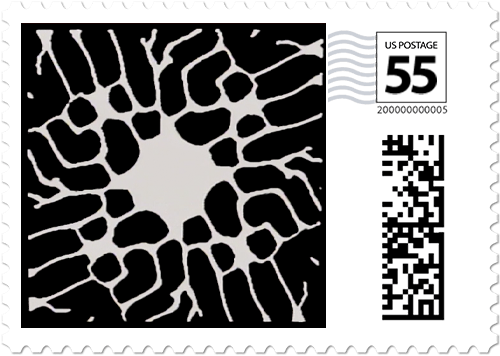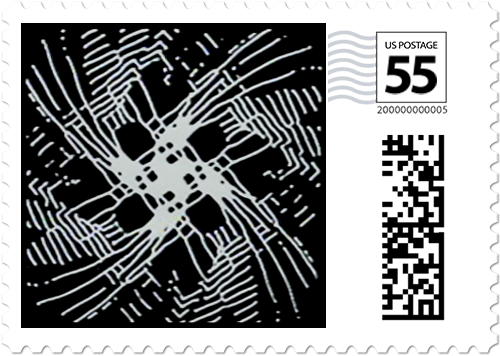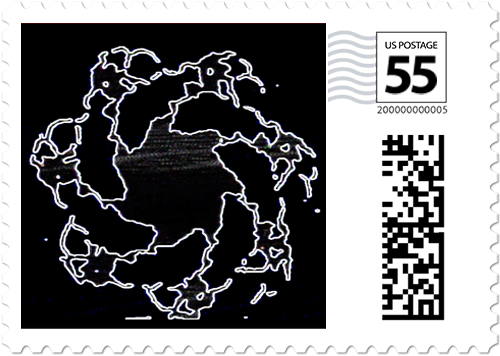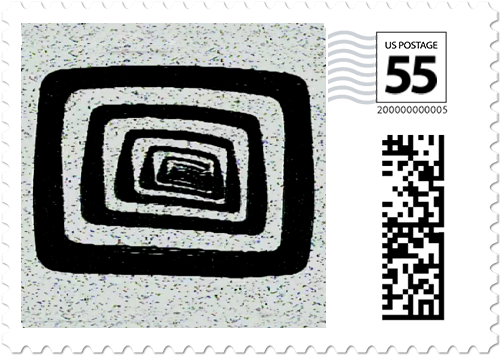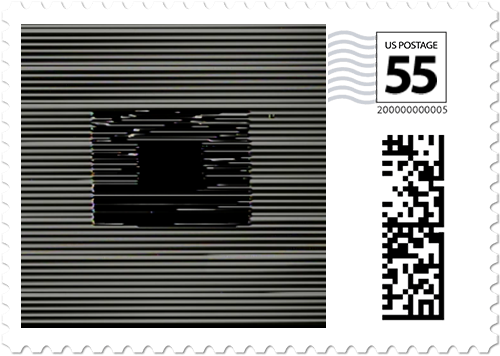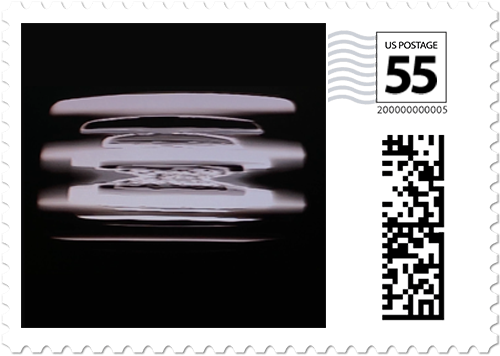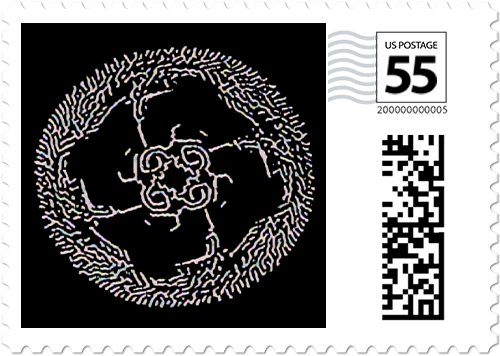

This series of postage stamps is based on a collection of stills from video feedback installations and made available in a limited printing with proceeds benefitting the Southern Poverty Law Center.
It is not widely known but the establishment of the U.S. postal system actually preceded the establishment of the federal government. Prior to its creation the closest thing to a postal service was a constellation of outposts and informal routes connecting one town to another. At the time Americans considered their allegiance to belong to their state first, and country second. Roads were difficult to travel then and decades before the creation of the telegraph most rural citizens had no connection to their family, their government, or to society-at-large. But with the advent of the U.S. Post Office the network of states established an accountable service which united the country and became the first direct link to the still-incubating federal government. For many towns their postal road was the first road which connected them to the larger community and their neighboring states. With the creation of the U.S. postal service communities could petition the government to establish a post office in their town, which then became a community hub to which newspapers were delivered free of charge, providing citizens with information about their representatives, and thereby engaging them in the political processes of the newly formed democracy.
During this time the U.S. Post Office was not profitable, nor was it intended to be. It was established for the benefit of society, and to that end it was effectively granted a monopoly. If you've ever wondered why private shipping companies don't place a parcel inside your mailbox it's because they are forbidden by law from opening it (at one time punishable by death). Your post box is intended to be a safe and confidential channel of communication provided for by the federal government. Operating in this quasi-monopoly status the postal service is likewise legally required to serve all citizens at a uniform price and quality of service regardless of locale, an obligation that would be incomprehensible to private industry. This is important to consider at a time when factions of the federal government are advocating for the privatization of the postal service. While these advocates frequently cite the proliferation of email, they fail to mention that email (itself nearly brought under the umbrella of postal protections) isn't offered freely but at the cost of relinquishing personal information, data which is then traded on an open market, and most recently weaponized by foreign governments.
It's also important to note that these are not new ideas being generated, but are part of a larger class war that has developed since the recession of the 1970s. Although today it's the GOP carrying the banner of postal service privatization, in the 1970s it was the Libertarian Party, whose financial backer, Charles Koch, forced the issue to be adopted into the party's platform. This was at a time when a small handful of wealthy industrialists were seizing all opportunities to dismantle the public sector as the economic recessions of the decade unfolded. The current incarnation of the postal service, the USPS, is itself a direct outgrowth of the labor protests of the 1970s, which helped establish the current federal agency and resulted in living wage increases and improved working conditions. Although it was Nixon who signed the bill implementing the current 'self-funding' model of the post office, the idea of privatization wasn't seriously discussed until the 1980s. At that point Ronald Reagan had risen to power, largely due to a populist backlash against a labor movement that had failed to sustain competent leadership, resulting in drawn out protests that wore down public sentiment. At the urging of the Libertarian wing of the conservative party a USPS privatization commission was formed, a conservative braintrust directed by Reagan acolyte James Miller, whose most well known accomplishment is having previously signed off on allowing ketchup to be considered a vegetable for the purposes of satisfying the nutritional requirement of public school lunches. The commission sought to limit postal service activity and slowly siphon off funding, with the goal being to ultimately cripple the agency and sell it off to private investors. To that end Miller designed and implemented the Orwellian named Postal Accountability and Efficiency Act. At this time the USPS was operating at a surplus, but the new legislation would require the pre-payment of future retiree health benefits (not pensions as is often misconstrued), a starkly onerous requirement that is solely applicable to the USPS and is mostly unheard of even in private industry. The move effectively drained the USPS of funds and began growing the deficit that has existed down to the present day. While it is true that mail volume has declined since the turn of the century, that is not the cause of the deficit. On the contrary, productivity levels have increased since that time, while the pre-payment requirements of the PAEA account for around 3/4 of the deficit. There is currently legislation pending in the senate which would obviate the politically motivated PAEA requirements, as well as implement true modernization of the postal service, measures which could on their own nearly wipe out the deficit. But that legislation has been obstructed by GOP senators who have likewise held up appointments to USPS leadership in an attempt to stall agency operations. The GOP opposes commonsense reforms because they know that the current PAEA model will ultimately lead to a collapse of services, making the USPS more attractive to private investors in the process.
At this point it's important to consider what's at stake. As the nation's third largest employer behind Walmart and Amazon the USPS employs over 500,000 people. While it's true that privatization would likely mean significant rate increases, and an end to subsidies currently provided to places like libraries, museums, and universities, more concerning is what it would mean to working conditions. Today nearly 40% of all mail services have been diverted into public-private partnerships with Walmart and other 'big-box' retailers who have begun offering services where the USPS was forced to curtail operations. These are retailers who have monopolized their sectors and pay low wages which guarantee poverty and worker reliance on government welfare, effectively subsidizing the public-private partnership far beyond what is explicit, and converting government welfare into private profit. This transitioning of another half million workers to Walmart or Amazon-like working conditions would be disastrous many times over. For every post office job cannibalized by a public-private partnership one is created by these retailers at a significant pay cut and lacking the health and retirement benefits which were established through the democratic processes of the past half century.
Regarding this series of postage stamps, working in an ephemeral medium typically means the question of documentation and preservation runs concurrent with the creative process. While I am usually disinterested in the retrograde commodification of creative work I found myself contemplating a series of postage stamps at the start of the new year as a format of preservation which would have a simple, practical function. I've always viewed the postal service as a manifestation of the democratic process, and have long been aware of right-wing attempts to privatize the USPS along with other elements of the public sector. While I didn't expect the recent mass politicization of the issue, and the outcry of public support, it's important to note that these are plans that have been intentionally crafted over the past several decades, and are not haphazard attempts. As is often the case, the current class of political leaders are little more than vessels for a few wealthy industrialists looking to narrow the public commons. That the crisis has subsumed issues of voting access is coincidental, and is likely seen as an opportunity for a political party that has fought to limit access to the polls year after year, most recently overturning the Voting Rights Act of 1965, a move which impacted some states more than others. A new initiative seeks to limit that damage. As noted by the Southern Poverty Law Center:
"Launched in 2019, the Voting Rights Practice Group works across the Deep South in collaboration with community partners and organizers to engage and mobilize voters, restore voting rights to returning citizens, pursue electoral policy reforms, and bring litigation to challenge unconstitutional and discriminatory voting practices."
With the purchase of these stamps you are making a donation to the Southern Poverty Law Center. They are derived from a video installation presented at the Made in NY Media Center in 2019. I am selling them at $10 per set of four with 100% of the proceeds benefitting the SPLC. Please feel free to contact me with any questions.
